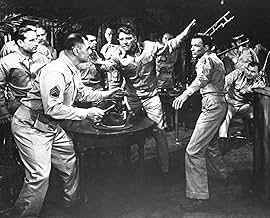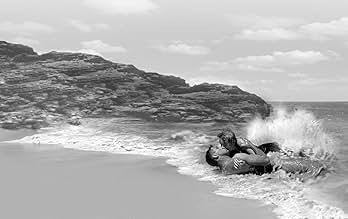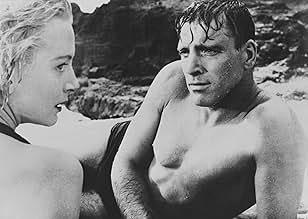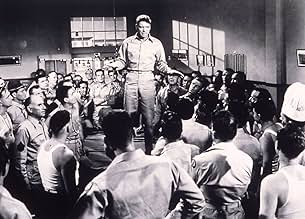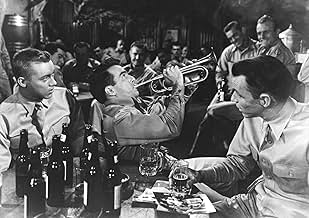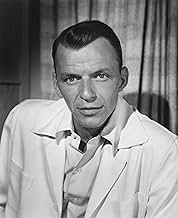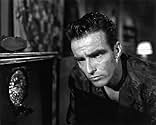No Havaí, em 1941, um soldado raso é cruelmente punido por não praticar boxe na equipe de sua unidade, enquanto a esposa de seu capitão e o segundo no comando se apaixonam.No Havaí, em 1941, um soldado raso é cruelmente punido por não praticar boxe na equipe de sua unidade, enquanto a esposa de seu capitão e o segundo no comando se apaixonam.No Havaí, em 1941, um soldado raso é cruelmente punido por não praticar boxe na equipe de sua unidade, enquanto a esposa de seu capitão e o segundo no comando se apaixonam.
- Direção
- Roteiristas
- Artistas
- Ganhou 8 Oscars
- 26 vitórias e 9 indicações no total
Claude Akins
- Sgt. 'Baldy' Dhom
- (não creditado)
Vicki Bakken
- Suzanne
- (não creditado)
Margaret Barstow
- Roxanne
- (não creditado)
- Direção
- Roteiristas
- Elenco e equipe completos
- Produção, bilheteria e muito mais no IMDbPro
Avaliações em destaque
In hindsight, this 1953 classic doesn't seem as much a military drama as it does a highly charged soap opera, which shouldn't come as a surprise given that master filmmaker Fred Zinnemann ("the Nun's Story") was at the helm. The veteran director upended the western genre just a year earlier with the Gary Cooper classic "High Noon", and he places the same incendiary focus of character over action here, that is, until the inevitable climax which uses the Japanese attack on Pearl Harbor as a catharsis for the characters' dilemmas now dwarfed by the coming world war.
Based on James Jones' epic novel, screenwriter Daniel Taradash manages to reduce the complexity of the book's themes without trivializing them, and then-offbeat casting enhances the movie immeasurably. Set on a U.S. Army base in Hawaii in the months leading up to the attack, the focus is on two men, both dedicated to the military with no aspirations to become the officers they have grown to detest. One is Private Robert E. Prewitt, a talented boxer (and bugler) who refuses to fight on his regiment's team since blinding a sparring partner. The other is First Sergeant Milton Warden, a take-charge, professional soldier who earns the trust of his men even as he kowtows to his weak-willed commanding officer.
Life in the barracks is fraught with adversarial personalities, chief among them Private Angelo Maggio, Prewitt's loudmouthed best friend, and Staff Sergeant "Fatso" Judson, the sadistic stockade warden. Both Prewitt and Warden meet women who seek to change their lives. Prewitt finds cynical nightclub "hostess" Lorene at a brothel masquerading as a social club, while Warden embarks on a passionate affair with his commanding officer's wayward wife Karen. Burt Lancaster is well cast as Warden, and he brings surprising nuance to his character's clandestine encounters with Karen. However, it's Montgomery Clift - despite looking too slight to be genuinely believable as a boxer - who transcends his loner role by playing off his innately sensitive nature to portray a man who will never sacrifice his honor despite how dire the consequences. Well within his comfort zone, Frank Sinatra's turn as Maggio is small but impactful.
Still two years away from "Marty", Ernest Borgnine makes Judson's malevolence palpable in just a few scenes. Deborah Kerr submerges her Scottish accent and previous lady-like demeanor to reveal the embittered, sexually assertive side of Karen without sacrificing any of the character's vulnerability. The legendary, much-parodied beach scene with Lancaster still sizzles after all these years. Similarly, Donna Reed foregoes her good-girl image (epitomized by her memorable turn as Mary Bailey in "It's a Wonderful Life") to play the sultry, delusional Lorene. The 2003 DVD comes with a small set of extras - a three-minute making-of retrospective short, a nine-minute collection of on-set footage and interviews from a documentary entitled "Fred Zinnemann: As I See It", and the original theatrical trailer. The best extra is the commentary track from Tim Zinnemann (the director's son) and screenwriter Alvin Sargent ("Spider-Man 2"), who had a small role in the movie.
Based on James Jones' epic novel, screenwriter Daniel Taradash manages to reduce the complexity of the book's themes without trivializing them, and then-offbeat casting enhances the movie immeasurably. Set on a U.S. Army base in Hawaii in the months leading up to the attack, the focus is on two men, both dedicated to the military with no aspirations to become the officers they have grown to detest. One is Private Robert E. Prewitt, a talented boxer (and bugler) who refuses to fight on his regiment's team since blinding a sparring partner. The other is First Sergeant Milton Warden, a take-charge, professional soldier who earns the trust of his men even as he kowtows to his weak-willed commanding officer.
Life in the barracks is fraught with adversarial personalities, chief among them Private Angelo Maggio, Prewitt's loudmouthed best friend, and Staff Sergeant "Fatso" Judson, the sadistic stockade warden. Both Prewitt and Warden meet women who seek to change their lives. Prewitt finds cynical nightclub "hostess" Lorene at a brothel masquerading as a social club, while Warden embarks on a passionate affair with his commanding officer's wayward wife Karen. Burt Lancaster is well cast as Warden, and he brings surprising nuance to his character's clandestine encounters with Karen. However, it's Montgomery Clift - despite looking too slight to be genuinely believable as a boxer - who transcends his loner role by playing off his innately sensitive nature to portray a man who will never sacrifice his honor despite how dire the consequences. Well within his comfort zone, Frank Sinatra's turn as Maggio is small but impactful.
Still two years away from "Marty", Ernest Borgnine makes Judson's malevolence palpable in just a few scenes. Deborah Kerr submerges her Scottish accent and previous lady-like demeanor to reveal the embittered, sexually assertive side of Karen without sacrificing any of the character's vulnerability. The legendary, much-parodied beach scene with Lancaster still sizzles after all these years. Similarly, Donna Reed foregoes her good-girl image (epitomized by her memorable turn as Mary Bailey in "It's a Wonderful Life") to play the sultry, delusional Lorene. The 2003 DVD comes with a small set of extras - a three-minute making-of retrospective short, a nine-minute collection of on-set footage and interviews from a documentary entitled "Fred Zinnemann: As I See It", and the original theatrical trailer. The best extra is the commentary track from Tim Zinnemann (the director's son) and screenwriter Alvin Sargent ("Spider-Man 2"), who had a small role in the movie.
10nawknek
"From Here to Eternity" contains the best performance delivered by an actor of any gender on celluloid. Montgomery Clift is assertive, funny, tough, sensitive and charismatic in the pivotal role of Robert E. Lee Prewitt, the rebellious loner with the streak of nobility. It is easy to see why James Dean idolized him after seeing his portrayal in the film. It is also a shame modern actors don't mention his name more often when listing their influences. As often noted, he preceded Brando by two years (he first appeared in Red River, released in 1948; Brando bowed in The Men in 1950)and created the arch-type of the 1950's rebel. But due to his intelligence, Clift also informed his characters with a sense of purpose. He didn't simply rebel. For instance, in Eternity, he apologises after an angry outbreak at his girlfriend. Instead of appearing weak, he impressed me all the more for doing so. It makes him appear more mature than the typical rebel. In another instance, when he feels his friend Maggio is being unfairly attacked, he "stares down" the attacker proving he looks out for his friend, another attractive quality. When the non-coms dole out extra punishment to him to force him to box, he refuses to file a complaint but likewise refuses to comply to their demands. Such moments distinguish Clift from other, more typically macho Hollywood leading men of the era and contributed greatly to Eternity's long initial run at the box office and its status as a classic piece of Hollywood cinema. It is time someone set the record straight and restored Montgomery Clift's name to its rightful place in the pantheon of Hollywood's great leading men. For proof, look no further than From Here to Eternity.
... from what we feed on these days and perhaps only of relevance as an artefact of the time it was released and the period it reflects, the way we behave and interact in the real world has changed unrecognisably since. It does, however, deliver us some top drawer performances from some genuinely talented performers, most of them to go on to much bigger and better things. All in all, a solid 1950s era film set in the prior decade before the outbreak of war, it uses multiple and interlinked sub plots to show us the sorrow and sadness experienced by numerous characters as a result of the choices they've made, the people they met and how they interacted.
The folks who made PEARL HARBOR should have done their homework on how to bring a personal romance into a historical event. This film should have been at the top of their list.
The Pearl Harbor attack is the climax of the film as well as of the various intricate human relationships in the film. This is a classic piece of romantic history, and the beach scene is probably one of the most erotic ever done -- all the more impressive because it has no nudity.
This is a real saga of human passion and how it is affected by history. Whether you see PEARL HARBOR or not is up to you. But definitely see this film.
The Pearl Harbor attack is the climax of the film as well as of the various intricate human relationships in the film. This is a classic piece of romantic history, and the beach scene is probably one of the most erotic ever done -- all the more impressive because it has no nudity.
This is a real saga of human passion and how it is affected by history. Whether you see PEARL HARBOR or not is up to you. But definitely see this film.
Classic 50's Hollywood feature documenting the lives and times of the US Army personnel in Hawaii leading up to the Japanese air attack on the Pearl Harbour naval base which precipitated the US entry into the second world war. Shot in black and white by Fred Zinnemann to emphasise the war-time setting, the drama is peopled with convincingly realistic characters with a credible, episodic narrative edging ever closer to the pivotal date of December 7th.
Multiple plot lines are skilfully interwoven until their climactic convergence at the end aided by top acting from a superb cast. The dramatic thread to the film is Montgomery Clift's Prewett character and his relationships with the characters played by Burt Lancaster, the firm but fair sergeant himself drawn into a sexually charged relationship with his superior officer captain's disaffected wife, played against type by Deborah Kerr, Donna Reed as the "hostess" he falls in love with and especially Frank Sinatra's rascally but likeable and always supportive Maggio.
Sinatra famously begged for the chance to show his acting skill in a straight role to reignite his career and duly given the chance, he grabs it with both hands. Lancaster and Kerr fire up the screen in their doomed relationship, especially in the famous scene by the crashing waves, Reed plays her part with admirable restraint but Clift's acting exceeds them all, whether in his reluctant fight scenes, blowing a bugle like Satchmo or playing a drunk after he's exacted revenge on Maggio's tormentor, played memorably by the recently deceased Ernst Borgnine.
The action climax as the Japanese attack is thrillingly portrayed especially the high camera shots, although I would question the too obvious and thus jarring insertion of real footage of the actual attack.
Controversial in its day for its unblinkingly honest depiction of the US army, it can be seen now as one of the best films of the 50's, a master class in dramatic narrative and character acting.
Multiple plot lines are skilfully interwoven until their climactic convergence at the end aided by top acting from a superb cast. The dramatic thread to the film is Montgomery Clift's Prewett character and his relationships with the characters played by Burt Lancaster, the firm but fair sergeant himself drawn into a sexually charged relationship with his superior officer captain's disaffected wife, played against type by Deborah Kerr, Donna Reed as the "hostess" he falls in love with and especially Frank Sinatra's rascally but likeable and always supportive Maggio.
Sinatra famously begged for the chance to show his acting skill in a straight role to reignite his career and duly given the chance, he grabs it with both hands. Lancaster and Kerr fire up the screen in their doomed relationship, especially in the famous scene by the crashing waves, Reed plays her part with admirable restraint but Clift's acting exceeds them all, whether in his reluctant fight scenes, blowing a bugle like Satchmo or playing a drunk after he's exacted revenge on Maggio's tormentor, played memorably by the recently deceased Ernst Borgnine.
The action climax as the Japanese attack is thrillingly portrayed especially the high camera shots, although I would question the too obvious and thus jarring insertion of real footage of the actual attack.
Controversial in its day for its unblinkingly honest depiction of the US army, it can be seen now as one of the best films of the 50's, a master class in dramatic narrative and character acting.
Oscars Best Picture Winners, Ranked
Oscars Best Picture Winners, Ranked
See the complete list of Oscars Best Picture winners, ranked by IMDb ratings.
Você sabia?
- CuriosidadesMontgomery Clift threw himself into the character of Prewitt, learning to play the bugle (even though he knew he'd be dubbed) and taking boxing lessons. Fred Zinnemann said, "Clift forced the other actors to be much better than they really were. That's the only way I can put it. He got performances from the other actors, he got reactions from the other actors that were totally genuine."
- Erros de gravaçãoThe impromptu bugle solo in the club includes notes that only a trumpet could hit.
- Citações
Robert E. Lee "Prew' Prewitt: Nobody ever lies about being lonely.
- Cenas durante ou pós-créditosOpening credits prologue: SCHOFIELD BARRACKS HAWAII 1941
- ConexõesEdited from December 7th (1943)
- Trilhas sonorasRe-enlistment Blues
(1953)
by James Jones, Fred Karger, Robert Wells
Sung by men in the barracks twice
Played often in the score
Principais escolhas
Faça login para avaliar e ver a lista de recomendações personalizadas
- How long is From Here to Eternity?Fornecido pela Alexa
Detalhes
- Data de lançamento
- País de origem
- Idioma
- Também conhecido como
- De aquí a la eternidad
- Locações de filme
- Halona Beach Cove, O'ahu, Havaí, EUA(Warden and Karen's kissing in the surf scene)
- Empresa de produção
- Consulte mais créditos da empresa na IMDbPro
Bilheteria
- Orçamento
- US$ 1.650.000 (estimativa)
- Faturamento bruto nos EUA e Canadá
- US$ 36.416
- Fim de semana de estreia nos EUA e Canadá
- US$ 18.176
- 7 de dez. de 2003
- Faturamento bruto mundial
- US$ 36.416
- Tempo de duração
- 1 h 58 min(118 min)
- Cor
- Mixagem de som
- Proporção
- 1.37 : 1
Contribua para esta página
Sugerir uma alteração ou adicionar conteúdo ausente



